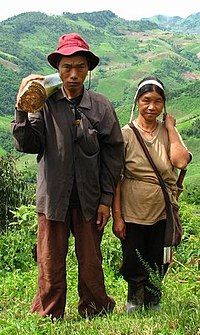
Photo from wikipedia
ABSTRACT Increasing and intensifying the use of land represents a prominent sustainability challenge of particular importance in regions undergoing rapid change while at the same time exhibiting large natural and… Click to show full abstract
ABSTRACT Increasing and intensifying the use of land represents a prominent sustainability challenge of particular importance in regions undergoing rapid change while at the same time exhibiting large natural and anthropocentrically induced variability. To reconcile the needs for both human prosperity and healthy ecosystems, a more integrated understanding of key biophysical and adaptation processes is paramount in such dynamic and deeply entangled social and environmental contexts. Interdisciplinary research utilizing a network perspective provides a novel methodological and theoretical approach to that end. We review and synthesize recent network-centric studies, and use this network perspective to show how rangeland managers in a dynamic pastoral region in the Qinghai Province of China form social relationships based on geographic proximity, social status and shared grazing areas. The results indicate that adaption to biophysical and socioeconomic changes is partly a social process in that rangeland managers develop their adaptive capacity jointly and in concert with others they trust and with whom they share grazing areas. Avenues for further development of this network perspective, in terms of how it might contribute important new insights about how to sustainably use land in dynamic landscapes undergoing rapid change, are suggested.
Journal Title: National Science Review
Year Published: 2023
Link to full text (if available)
Share on Social Media: Sign Up to like & get
recommendations!